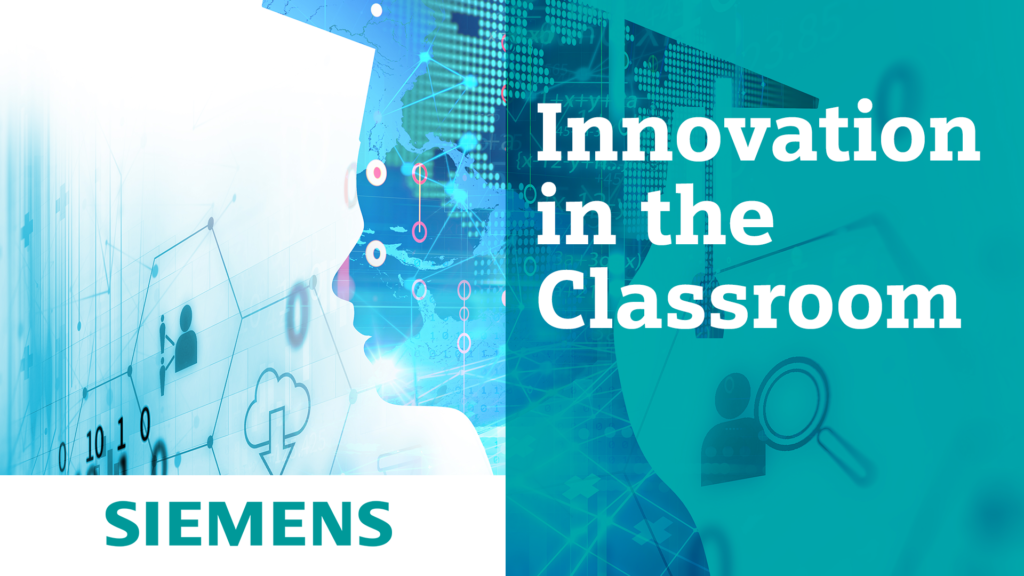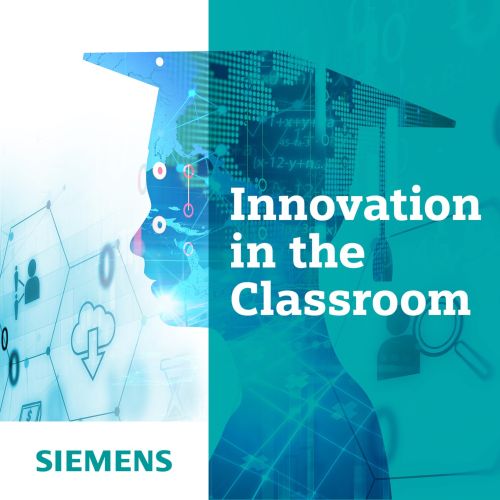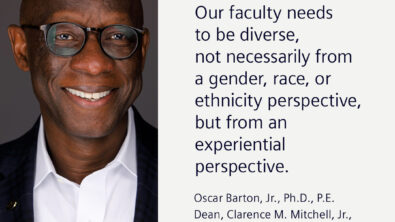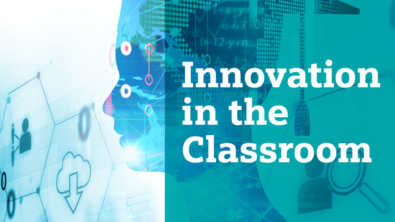Podcast Transcript: A Promising Venture: The Leoni and the University of Sonora Partnership

On this insightful episode of Innovation in the Classroom, join host Jennifer Bradford and her guests, Adrián Aello of Leoni and Jesus Pacheco of the University of Sonora, as they explore the strides that higher education is taking to address the industry skills gap. Listen in as Adrián and Jesus discuss the partnership program between the University and Leoni to introduce industry-level skill sets to the next generation of engineers.
“I believe the new generations are more focused on technology. This is why it’s easier and feasible for them to adapt in this modality, where design dictates the way in which the physical assembly of the product arrives… So, with this partnership association, practically, we’re training students in the usage of these Siemens tools, easing and avoiding time consumption in preparation before being hired in the company.”
Adrián Aello
Read the Transcript
Jennifer Bradford: Hi, everybody, and thanks so much for joining us today for the podcast. My name is Jen Bradford, and I’m with the Siemens Global Academic Program. I’m joined today by Adrián Aello from Leoni and Jesus Pacheco from the University of Sonora. I would love to talk with you guys a bit about the partnership between the University and Leoni. So, can you tell me a little bit more about how that came to be? Maybe, Adrián, we’ll start with you.
Adrián Aello: Yes, of course. Thank you for the question. We saw an area of opportunity with a future approach to create a seatbelt or a bridge for young graduates, with the objective to create a career plan with us and develop their skills at a very young age since their professional education. Universidad de Sonora is the alma mater of a lot of engineers in the company and in the region. So, the idea of this project was good seen between both ends.
Jennifer Bradford: And Jesus, do you have anything to add to that?
Jesus Pacheco: Well, basically, that we’re pleased to collaborate with Leoni here in this career they have. We are happy to see how is this working.
Jennifer Bradford: And what would you say was the big driving force for Leoni behind this? I mean, obviously, as you just mentioned, you want to ensure that there are qualified engineers coming out of the program. Would you say that there were larger community concerns? Or have you seen some particular fiscal return on that?
Adrián Aello: I believe the new generations are more focused on technology. This is why it’s easier and feasible for them to adapt in this modality, where design dictates the way in which the physical assembly of the product arrives. Talking about the harness industry, being for them, these big attractions seeing how the result is materialized in a digital way. So, with this partnership association, practically, we’re training the students in the usage of these Siemens tools, easing and avoiding time consumption in preparation before being hired in the company.
Jennifer Bradford: Very good. I’m wondering if both of you, Adrián and Jesus, from each of your perspectives, can just describe a day in the life, like what this program looks like as far as how many semesters a student might be involved in this program? What it means as far as having folks from Leoni be in the school? And what courses this might involve? Is that something that you think would be helpful?
Adrián Aello: Yes, it’s a program that could be helpful in the future for both sides. We’re creating like a seatbelt, like a bridge between the last semester graduate students to enter the industry, to enter the company from Leoni at a very young age. Also, with this success and with this program, we have already an idea of replicating this in even younger technical students in younger age, in 18 years, this has been a very successful problem. And I’m very grateful to have that experience for me to share my thoughts regarding this program.
Jesus Pacheco: Yeah, I can talk a little bit more from the point of view of the university. A day in the life of, let’s call it a regular student, we throw a bunch of maths to them, they get it, they don’t know how or where to apply it, they get bored because they say, “Okay, this never will be applied.” But the students who are in touch with the company, not necessarily related to EDA or any specific software. Just by being in touch inside of the company, seeing the problems, then they relate whatever they are learning here with whatever they have there. So, in that way, I feel they are more mentally mature, and they have a clearer idea on how to apply this knowledge once they go out, in comparison with the students who have not this opportunity to go and interact and talk with experts from the industry or any other company.
Jennifer Bradford: That’s great. Have you had any real particular successes, anything that comes to mind that this program has driven, whether it’s been some particularly great candidates or anything else?
Adrián Aello: Yes, personally, I see this in two approaches. The first one focused on what was already mentioned, the time and resources saved in training has been a successful case, because the engineer enters, practically, the process at the moment of being hired. So, it’s embodied in the process immediately. As now, since the first course given years ago, we had several successful cases where engineers that are being hired are right now sending engineers and supervisors or team leaders in our site. And the second one is that it’s very replicable and scalable. The ease in which this can be applied in other sites, plants, and countries around the world is huge. Leoni, in Hermosillo, we’re the pioneers in starting this here with the fortune that I was the first person of mentoring providing the course to the students, but other plants and sites around the world in Leoni, like Poland and Romania, are replicating these nowadays, and the results have been successful.
Jennifer Bradford: That’s fantastic. And Jesus, from the university’s perspective, do you feel like this has drawn additional students to your program because they’re excited about this opportunity with Leoni?
Jesus Pacheco: Of course, that’s a big plus that we have here. Because as we know, and as we notice here in this region, we have a challenge here – the industry is growing, and it’s getting even more complex and require better-prepared engineers. So, by means of these kinds of programs, we can offer more opportunities to our students.
Jennifer Bradford: That’s great. Have you seen an increase in enrollment in that particular program since the Leoni program started?
Jesus Pacheco: Well, not exactly like that because we have a specific batch of students that we take each year. So, in that case, it doesn’t increase in batch but it increases in requests. We have more candidates lately.
Jennifer Bradford: That’s great to hear. Adrián, can you talk a little bit about the skills gap between what it is that you see most students graduate with versus what it is that Leoni is looking for in new engineers? So, obviously, this program is meant to address that skills gap. But for those candidates who don’t come from this program, what are the sorts of deficiencies that you see from recent graduates?
Adrián Aello: My opinion regarding this is that most of the students don’t even have the experience in any official work environment in this kind of industry. So, they see a lot of theory in school, there’s no notion of what they’ll actually see in the industry or in a manufacturing plant as Leoni. So, my feeling or perception is that they will need to see more simulation or real cases that will happen in a specific scenario in the industry, focusing on manufacturing or automotive industry, that is very common in the region. So, our expectation with this is that students get more interest to then achieve a better notion of understanding of the tools given in the industry.
Jennifer Bradford: Jesus, do you have any thoughts about what could be happening in the university space – outside of programs like this one was Leoni – to address that skills gap? And where are you seeing your recent graduates, when you talk to them? What are you hearing them say, “Oh, I wish I had had more project-based learning or more collaborative learning or more cross-disciplinary learning?” What are you hearing in that space?
Jesus Pacheco: Yeah, basically, they like to have a challenge, like a real-world challenge, so they are more interested than usual – “Okay, look, this is what is happening. This is the need of the company. And this is a real need, so better to perform and deliver in a good way.” So, they really learn a lot more when they are in touch with the real environment, like in this case, Leoni, which gives us the opportunity to work with them. That’s happening.
Jennifer Bradford: That’s great to hear. That’s one of the things that we hear most commonly from professors all over the world is that they need to have opportunities to align their students with industries. And likewise, the most common thing that we hear from our customers is that we need students, we need graduates, who have had some kind of real-world experience. Obviously, our support for student competition teams is a huge part of that, but partnerships like this are the other part of that. So, can you talk a bit, Jesus, about how having access to the Siemens EDA software has facilitated this partnership? And please feel free to weigh in on that, Adrián, as well.
Jesus Pacheco: So, basically by providing targeted training specifically for the needs of the company, I mentioned highly specialized companies like Leoni have specific requirements that perhaps cannot be covered in standard coursework of our students here in academia. With Siemens EDA Mentor software, it was possible to create a collaborative environment where experts from the industry share their knowledge with students, giving them the opportunity to mature the knowledge right after finishing their studies.
Jennifer Bradford: That’s fantastic.
Adrián Aello: It’s very important what Jesus was mentioned. As I mentioned earlier, we try to build this bridge between the students and the industry. So, it is very important to build these programs in order to address that and to focus on the development of the student. So, it’s a very important thing to perform that.
Jennifer Bradford: So, what do you think, in a perfect world, partnerships between industry and academia look like? To ensure that, of course, companies like Leoni can hire workers with the skills that they need. But in general, what do you think are some of the creative solutions that might drive other universities and other companies to build partnerships similar to this one?
Jesus Pacheco: I like to see these challenges as – and I put some quotes here – pains of the company. So, by sharing their pains, meaning that the company shares a need, and the students are assigned to the challenge. Of course, there should be a commitment both ways from the company to provide not only the data or information but also experience and knowledge from the university. On the other hand, the commitment should be delivering the best possible results. So, this way the students can benefit from the fact that they are in direct contact with the real-world challenge. And at the same time, they will acquire some experience.
Jennifer Bradford: That’s really interesting. So, it sounds like you’re posing almost a think tank sort of partnership, where the industry is able to come to academia with problems that they’re trying to solve. And then students are able to really apply what they’ve learned in the classroom to solving those very real problems.
Jesus Pacheco: We like that.
Jennifer Bradford: Yeah, absolutely. And how about you, Adrián, do you have any thoughts on that?
Adrián Aello: Yes, I think Jesus spoke everything much about this. I think that the career plan of the students should be very focused on the manufacturing industry to apply these engineering tools to be digitalized like Siemens software, and in simulation cases, basing on the specifics. But yes, Jesus, I believe, answered the question correctly.
Jennifer Bradford: So, for you, Adrián, if you could impart any information, what do you wish that university administrators and faculty all over the world knew about what it is that industry needs? If you could have their ear for a moment, what would you tell them that they really need to focus on for preparing their students for your employment?
Adrián Aello: Yes, of course. Well, my advice could be to try to link more the theoretical subjects or programs in their careers to something more realistic or practical and focusing on the manufacturing industry. As we know, we live in an industry that we have some future regarding digitalization. And that could be my advice for universities and administrators.
Jennifer Bradford: And for your part, Jesus, having seen this program work, is there anything that you wish you could tell your fellow educators around the world or administrators for that matter? What would you like for them to understand about how this program has worked well for the University of Sonora?
Jesus Pacheco: Well, I’ll like to add that training with mentoring aid from an industry or company is very important. As we have mentioned before, if the student is exposed to the need, to the real needs of the company, they study, and at the same time, train to accomplish a given goal. This way, once the students graduate, it comes with an intellectual property, that we haven’t mentioned here, embedded. For instance, if a student solves a problem or creates a device for the company, and the company hires that student, the company is not only acquiring a workforce just like that, but it’s also acquiring knowledge.
Jennifer Bradford: That’s absolutely a great point.
Adrián Aello: I want to thank you for the opportunity and the invitation. It has been a very grateful experience for me to share my thoughts regarding this problem. And I want to thank everyone involved, to the moderators that made possible all this forum, and I’m very open to future opportunities of sharing experiences or lessons learned. Thank you.
Jennifer Bradford: That’s great. I really appreciate you guys participating. I know it’s been a little bit of a reach to get our schedules all coordinated. But yeah, I really appreciate it.

Innovation in the Classroom
Innovation in the Classroom by Siemens explores best practices to empower the next generation of digital talent. In this podcast series, Dora Smith takes you through discussions with leading voices from the world of engineering education who are preparing future engineers in Academia 4.0 to shape the world of innovation.


